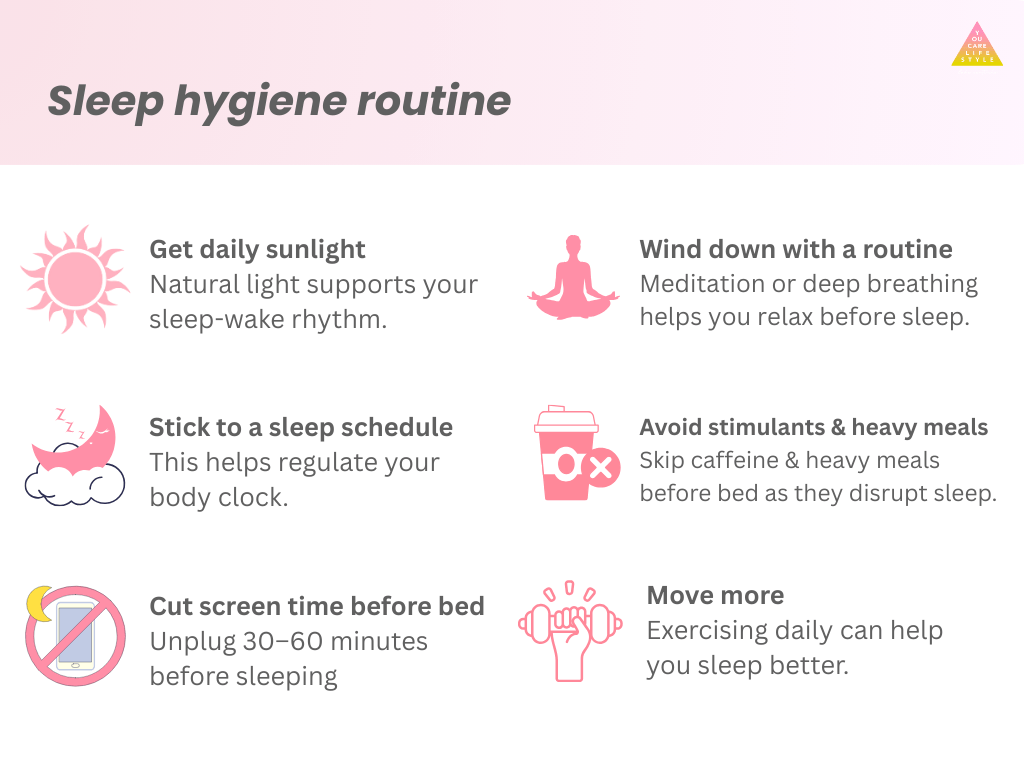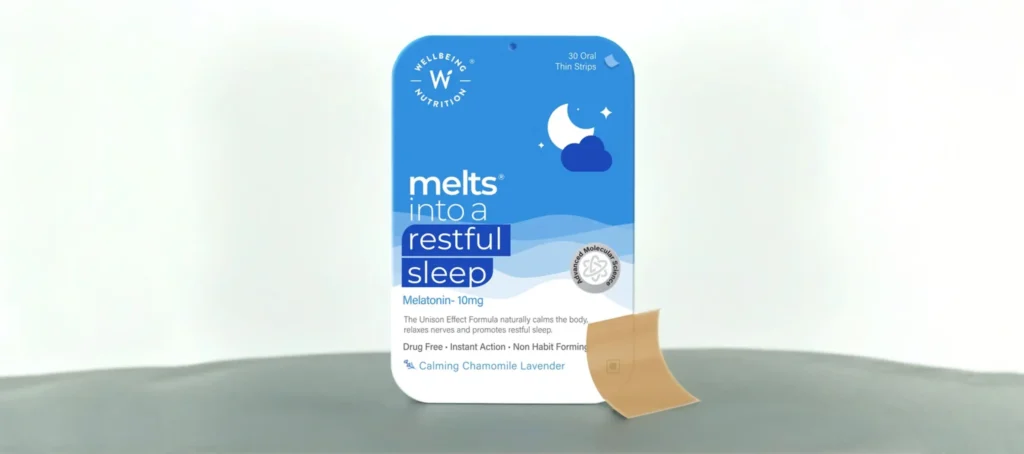Melatonin Magic: 5 Smart Habits for Better Sleep Quality

Table of Contents
Introduction
Melatonin and sleep are deeply connected – yet for many, that natural rhythm is out of tune. It’s 2 AM, and you’re not the only one awake.
Across India, countless people lie in bed scrolling through social media, answering late-night messages, or simply staring at the ceiling – tired but wired. What seems like a small lifestyle habit has quietly grown into a nationwide health concern.
Recent studies reveal a worrying decline in sleep quality over the last decade. Beneath the hustle, a silent epidemic is brewing, leaving millions exhausted, irritable, and running on empty.
A recent Bengaluru ad made waves when a person was spotted napping on a mattress inside a transparent van stuck in traffic. While the idea was a marketing stunt, it struck a raw nerve – in a culture obsessed with productivity, rest has become a luxury, not a necessity.
It’s time we changed that.
The Silent Epidemic
Over the past five years, research has painted a grim picture of India’s sleep habits.
A 2025 global survey by ResMed revealed that nearly 49% of Indian respondents struggled to fall asleep at least three nights a week. This isn’t about the occasional restless night, it’s a recurring issue for millions.
Meanwhile, according to the Indian Council of Medical Research (ICMR, 2021), 1 in 3 Indians is chronically sleep-deprived. This silent epidemic is doing more than just making people groggy. Poor sleep is linked to higher risks of heart disease, weakened immunity, poor mental health, diabetes and even early cognitive decline. It’s pushing up healthcare costs and silently draining productivity from a workforce that’s already stretched thin.
So, what’s really keeping India awake?
Experts point to a combination of lifestyle overload and digital dependence. Blue light from screens, late-night caffeine, irregular meals, and chronic stress are disrupting melatonin, the hormone that governs the sleep-wake rhythm.
Sleep Deeper India
Sleep isn’t just about closing your eyes, it’s a biological process where the body heals, detoxifies, and resets. During deep sleep, the brain clears metabolic waste through the glymphatic system, cells repair themselves, and memory consolidates.
But today’s modern routines have thrown this system into disarray.
Here’s why many Indians struggle to achieve restful, restorative sleep:
1. Excessive screen time: Blue light exposure from phones and laptops suppresses melatonin production, delaying sleep onset.
2. Irregular work hours: Shift work and “always-on” jobs disrupt the body’s circadian rhythm.
3. Caffeine and sugar intake: Evening tea, coffee, or desserts can elevate alertness levels far past bedtime.
4. Chronic stress: Elevated cortisol levels (the stress hormone) block melatonin production, keeping the body alert even when tired.
5. Undiagnosed sleep disorders: Conditions like insomnia or Obstructive Sleep Apnea (OSA) remain largely unaddressed.
Healthy sleep hygiene is essential to combat these disruptions and improve sleep quality. Here’s how:

The good news? You can re-align your body’s sleep rhythm naturally by nurturing the hormone that guides it – melatonin.
5 Smart Habits to Regulate Melatonin Naturally
Melatonin, a hormone naturally produced by the pineal gland, helps regulate the circadian rhythm, the internal clock that tells us when to sleep and wake.
The synthesis begins as ambient light decreases, with levels typically rising around 8-9 PM and peaking between 2-4 AM. This peak aligns with the body’s natural readiness for deep, restorative sleep.
When exposed to light, especially blue wavelength light, the production is suppressed, which is why screen exposure at night can delay sleep onset.
Melatonin levels naturally taper off in the early morning hours, allowing cortisol (the “wake-up” hormone) to rise and signal the body to start a new day.
Certain habits and foods can support this natural rhythm and help improve sleep quality.
1. Step Into Morning Light
Your body’s circadian rhythm thrives on light cues. Exposure to natural sunlight within the first hour of waking helps anchor your sleep-wake cycle.
Morning light suppresses residual melatonin, boosts serotonin, and trains your body to release melatonin earlier that evening, helping you fall asleep faster.
Tip: Spend at least 15–20 minutes outdoors in the morning, preferably without sunglasses. Even a short balcony sunbath or a morning walk works wonders.
2. Eat for Sleep: Include Tryptophan-Rich Foods
Tryptophan, an essential amino acid, is the starting point for both serotonin and melatonin synthesis.
Foods like oats, dairy, banana, nuts, seeds, tofu, and lentils help increase serotonin levels, which later convert to melatonin (Wang et al., Biotechnology for Biofuels and Bioproducts, 2024).
Try a light dinner bowl with oats, milk, and walnuts or a small serving of paneer and seeds before bed — a comforting, melatonin-friendly meal.
3. Sip Tart Cherry Juice
This humble red fruit has become a superstar in sleep research.
Studies show that tart cherry juice naturally increases melatonin levels, improving both sleep duration and quality.
Sleep tip: Drink a small glass (about 150 ml) 1–2 hours before bedtime. It’s rich in antioxidants too, which helps reduce nighttime inflammation.
4. Focus on Magnesium for Calm
Magnesium supports more than 300 biochemical reactions, including those that promote relaxation and melatonin production.
Low magnesium levels have been linked to poor sleep quality, restlessness, and nighttime cramps.
Foods like leafy greens, legumes, pumpkin seeds, and whole grains are great sources.
If your diet falls short, magnesium supplementation under expert guidance has shown improved sleep efficiency (Nutrients, 2022).
To know more on Magnesium Read our blog
5. Snack on Sleep-Supporting Nuts
Among all plant-based foods, pistachios and walnuts contain the highest natural melatonin content.
Just a small handful can boost blood melatonin concentration and improve sleep latency (Nutrients, 2022).
Try this: A pre-bed snack of a few pistachios, or add crushed walnuts to your warm milk, it’s a simple ritual that signals the body it’s time to rest.
Supplementing Melatonin: Smart support or shortcut?
While a food-first approach is ideal, there are situations where melatonin supplements can offer support, especially when the body’s natural production is disrupted.
1) Shift workers or those working late nights often struggle with irregular light exposure, which throws off their natural circadian rhythm.
2) Older adults typically experience a decline in melatonin production, which can lead to lighter, fragmented sleep.
3) Frequent travelers dealing with jet lag may find low-dose melatonin useful for resetting their internal clock.
4) People with insomnia or delayed sleep phase disorder, under medical supervision, may use melatonin to ease sleep onset.
But remember: melatonin is not a sleeping pill.
It’s a hormone signal – taking high doses can confuse your body’s internal rhythm rather than restore it.
Potential risks of overuse:
~ Morning grogginess or brain fog
~ Hormonal imbalance
~ Interaction with medications (antidepressants, blood thinners)
~ Suppressed natural melatonin production over time
Expert tip: Start low (0.3–1 mg) and only use for short-term cycles under guidance. Consistency in your bedtime routine matters more than any supplement.
Meet your gentle sleep ally, Pink Tiger verified
When lifestyle tweaks and dietary changes aren’t enough, your health care provider may recommend reaching out for extra support. With so many options available, make sure you choose the one that truly delivers.
Pink Tiger conducts stringent checks so that you can access clean and safe options without a doubt. Our rigorous testing ensures that every supplement:
✅ Verified for label accuracy – what’s listed is what’s inside.
✅ Tested for heavy metals and toxins – ensuring full compliance with international safety standards.
✅ Free from artificial colors, sugar, or fillers – pure formulations that support your health without compromise.

Final Thought
Sleep isn’t passive downtime, it’s an active biological reset. While you rest, your body fine-tunes its systems: hormones are balanced, the brain is detoxified, and your metabolism gets recalibrated.
Skimping on sleep doesn’t just make you tired, it sets off a ripple effect that touches every corner of your health.
So, whether you’re navigating stress, irregular routines or trying to find your rhythm again, know this: prioritizing sleep isn’t indulgent, it’s intelligent.
Because better sleep starts with trust and ends with true rest.
Frequently Asked Questions (FAQs)
1. What exactly is melatonin, and how does it help you sleep?
Melatonin is a naturally occurring hormone produced by the pineal gland in the brain. It acts as a timekeeper for your body’s internal clock, helping regulate the sleep–wake cycle. As daylight fades, melatonin levels start to rise, signaling to your body that it’s time to wind down and rest. It doesn’t make you fall asleep instantly, but rather primes your body for rest by lowering alertness, body temperature, and blood pressure. Disruptions in melatonin production often caused by excessive light exposure at night or irregular sleep schedules can make it harder to fall asleep and stay asleep.
2. How does light exposure affect melatonin production?
Light; especially blue light emitted by phones, TVs, and computers—has a powerful suppressive effect on melatonin. When your eyes detect light, the brain interprets it as daytime and halts melatonin release. That’s why using screens late at night can delay sleep and reduce its quality. Conversely, exposure to bright light in the morning helps reset your internal clock, signaling your body when to increase and decrease melatonin levels later in the day.
3. Can stress and anxiety reduce melatonin levels?
Yes, chronic stress and anxiety can indirectly reduce melatonin levels by increasing cortisol, the stress hormone that keeps you alert. High cortisol at night disrupts the balance between “wake-up” and “sleep” signals, delaying melatonin production and shortening deep sleep phases. Relaxation practices such as meditation, deep breathing, or gentle yoga before bed can lower cortisol and naturally encourage better melatonin release.
4. Can you increase melatonin naturally without supplements?
Yes, absolutely. The best way to enhance natural melatonin production is by improving your daily habits and sleep hygiene. Getting 15–30 minutes of natural sunlight exposure early in the morning helps synchronize your circadian rhythm. Avoiding blue light (from phones or laptops) at least an hour before bed, eating a balanced diet with melatonin-supportive nutrients like tryptophan and magnesium, and maintaining a consistent sleep schedule can all make a noticeable difference. In short, your daily routine is your strongest natural melatonin regulator.
5. How do food and diet affect melatonin levels?
Certain foods can help support melatonin synthesis in the body. For example, tryptophan-rich foods like oats, dairy, and nuts contribute to serotonin production, a precursor to melatonin. Magnesium-rich foods such as leafy greens, lentils, and pumpkin seeds also promote relaxation and better sleep. Tart cherry juice, in particular, has been shown in studies to naturally boost the levels and improve sleep duration. In contrast, caffeine, alcohol, and heavy late-night meals can disrupt the release and delay sleep onset.
Disclaimer: This content is for informational purposes only and is not a substitute for professional medical advice, diagnosis or treatment. Always consult your healthcare provider before trying any new food items, supplements, or products.
References
1) Ramar, K., Malhotra, R. K., Carden, K. A., Martin, J. L., Abbasi-Feinberg, F., Aurora, R. N., Kapur, V. K., Olson, E. J., Rosen, C. L., Rowley, J. A., Shelgikar, A. V., & Trotti, L. M. (2021). Sleep is essential to health: an American Academy of Sleep Medicine position statement. Journal of Clinical Sleep Medicine, 17(10), 2115–2119. https://doi.org/10.5664/jcsm.9476
4) Banthiya, S., Sharma, S., Jahagirdar, D., Jahagirdar, V., Garg, M., & Sahadev, H. (2021). Sleep quality in the Indian adult population during the COVID-19 pandemic. Cureus. https://doi.org/10.7759/cureus.17535
5) Jha, V. M. (2022). The prevalence of sleep loss and sleep disorders in young and old adults. Aging Brain, 3, 100057. https://doi.org/10.1016/j.nbas.2022.100057
6) Fatemeh, G., Sajjad, M., Niloufar, R., Neda, S., Leila, S., & Khadijeh, M. (2021). Effect of melatonin supplementation on sleep quality: a systematic review and meta-analysis of randomized controlled trials. Journal of Neurology, 269(1), 205–216. https://doi.org/10.1007/s00415-020-10381-w
7) Wang, L., Deng, Y., Gao, J., Wang, B., Han, H., Li, Z., Zhang, W., Wang, Y., Fu, X., Peng, R., Yao, Q., Tian, Y., & Xu, J. (2024). Biosynthesis of melatonin from l-tryptophan by an engineered microbial cell factory. Biotechnology for Biofuels and Bioproducts, 17(1). https://doi.org/10.1186/s13068-024-02476-7
8) Howatson, G., Bell, P. G., Tallent, J., Middleton, B., McHugh, M. P., & Ellis, J. (2011). Effect of tart cherry juice (Prunus cerasus) on melatonin levels and enhanced sleep quality. European Journal of Nutrition, 51(8), 909–916. https://doi.org/10.1007/s00394-011-0263-7
9) Breus, M., Hooper, S., Lynch, T., & Hausenblas, H. (2024). Effectiveness of Magnesium Supplementation on Sleep Quality and Mood for Adults with Poor Sleep Quality: A Randomized Double-Blind Placebo-Controlled Crossover Pilot Trial. Medical Research Archives, 12(7). https://doi.org/10.18103/mra.v12i7.5410
10) Givler, D., Givler, A., Luther, P. M., Wenger, D. M., Ahmadzadeh, S., Shekoohi, S., Edinoff, A. N., Dorius, B. K., Baptiste, C. J., Cornett, E. M., Kaye, A. M., & Kaye, A. D. (2023). Chronic administration of melatonin: physiological and clinical considerations. Neurology International, 15(1), 518–533. https://doi.org/10.3390/neurolint15010031